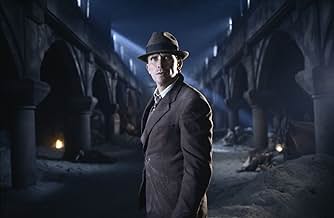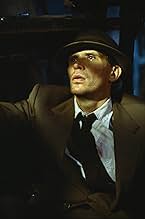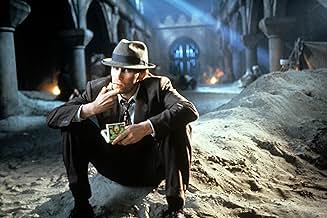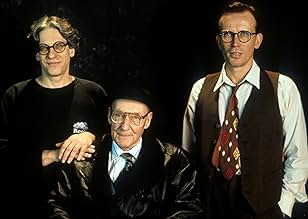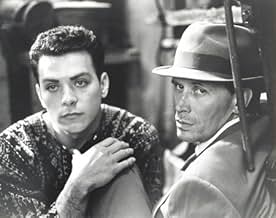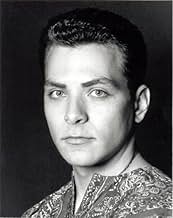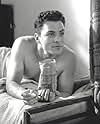पदार्थों को मारने वाली दावा की लत लग जाने के बाद, एक संहारक गलती से अपनी पत्नी को मार देता है, और उत्तरी अफ्रीका के एक बंदरगाह शहर में विशाल कीड़े द्वारा रची जा रही एक गुप्त सरकारी साजिश में... सभी पढ़ेंपदार्थों को मारने वाली दावा की लत लग जाने के बाद, एक संहारक गलती से अपनी पत्नी को मार देता है, और उत्तरी अफ्रीका के एक बंदरगाह शहर में विशाल कीड़े द्वारा रची जा रही एक गुप्त सरकारी साजिश में शामिल हो जाता है।पदार्थों को मारने वाली दावा की लत लग जाने के बाद, एक संहारक गलती से अपनी पत्नी को मार देता है, और उत्तरी अफ्रीका के एक बंदरगाह शहर में विशाल कीड़े द्वारा रची जा रही एक गुप्त सरकारी साजिश में शामिल हो जाता है।
- पुरस्कार
- 13 जीत और कुल 17 नामांकन
Joseph Scoren
- Kiki
- (as Joseph Scorsiani)
Louis Ferreira
- Exterminator #3
- (as Justin Louis)
फ़ीचर्ड समीक्षाएं
God, I like Cronenberg. I like his commitment. I like his designs. I like the fact that he deals straight and heavy.
I even like the feel of this movie while at the same time noting that it fails, at least it fails if you consider the value of the book.
The book is one of many that deals with the sliding overlap between one reality and another. I welcome any of these. And this is particularly attractive because of the animate typewriters-become-agent-controllers. These are much more visceral in the film. But the book made much of the scintillating overlap, the typed page that touched the earth from time to time that we would literally hold in our hands to assure us that there was a reality.
Cronenberg has none of this. As with all his films, there is one world, and he invests heavily in making it real. So we see ourselves, the typewriter that takes control, that provides the trance, the words, the enticement toward perversion of several types and its means. Cronenberg's slip into alternative universes is slippery only one way; he won't let us come home. I admire this, because I would rather see passion invested by an artist than compromise for something as trivial as effect. But here, I do miss the effect.
Judy Davis is her usual sublime self. The character (actually two, sortof) is a mess and is never anchored. But she herself is, outside the film. Her character's role is crucial to the thing, a sort of fulcrum around which the real and hallucinogenic revolve. Sex, meaning, holding onto the world. She accomplishes this not through the character, but the solid soul of the actress which shines through. Who else can do this? No one I know.
Ted's Evaluation -- 3 of 3: Worth watching.
I even like the feel of this movie while at the same time noting that it fails, at least it fails if you consider the value of the book.
The book is one of many that deals with the sliding overlap between one reality and another. I welcome any of these. And this is particularly attractive because of the animate typewriters-become-agent-controllers. These are much more visceral in the film. But the book made much of the scintillating overlap, the typed page that touched the earth from time to time that we would literally hold in our hands to assure us that there was a reality.
Cronenberg has none of this. As with all his films, there is one world, and he invests heavily in making it real. So we see ourselves, the typewriter that takes control, that provides the trance, the words, the enticement toward perversion of several types and its means. Cronenberg's slip into alternative universes is slippery only one way; he won't let us come home. I admire this, because I would rather see passion invested by an artist than compromise for something as trivial as effect. But here, I do miss the effect.
Judy Davis is her usual sublime self. The character (actually two, sortof) is a mess and is never anchored. But she herself is, outside the film. Her character's role is crucial to the thing, a sort of fulcrum around which the real and hallucinogenic revolve. Sex, meaning, holding onto the world. She accomplishes this not through the character, but the solid soul of the actress which shines through. Who else can do this? No one I know.
Ted's Evaluation -- 3 of 3: Worth watching.
If you're interested in the author of the book or the director of this film you have either already watched this film or you're waiting for the right time to watch it.
If you found this film by accident all you need to know to decide if its for you is that it is both the most homosexual and meta contextual film ever made and a solid contender for one of the most surreal films.
Do not recommend for family movie night unless you have ulterior motives or you're related to film/literature nerds.
If you found this film by accident all you need to know to decide if its for you is that it is both the most homosexual and meta contextual film ever made and a solid contender for one of the most surreal films.
Do not recommend for family movie night unless you have ulterior motives or you're related to film/literature nerds.
Naked Lunch seems to be just totally incomprehensible upon first viewing. However, after watching it again, you start to understand more and more. Upon multiple viewings, you really get a feel for what's transpiring before your eyes. The ultimate message is that it is really just a metaphor for heroin addiction, even though it's so much more deeper than that. It's an intricate study of a man, William S. Burroughs, who was a heroin addict, and among other things one of the most significant Beat authors ever. The film delves deeply into the psyche of Burroughs and takes you on a trip in his mind and your own. There are touches of reality and many flashes of paranoia, and it is all done with style and grace. Seriously one of the best films about an author, Naked Lunch will certainly stand the test of time against other films which may seem at first entertaining, but lose their luster upon multiple viewings. Whereas, Naked Lunch, in my opinion, never will. 10 out of 10.
Lots of people will hate this film, and some will love it.
The bottom line is, if you enjoy, respect, or feel that you understand the work of William S. Burroughs, you should see this film. If you don't know what I am talking about, you should probably not see this film.
The following pedantic and potentially inflammatory review, like this film, pulls no punches and makes no apologies for itself. Read on if you dare.
_________
If any three of the following conditions apply see Naked Lunch:
YOU
1. ...know what the term "visual metaphor" means.
2. ...are a Burroughs, Kerouac or Ginsburg fan.
2a. ...are not a fan, but know and respect Burroughs, Kerouac or Ginsburg
3. ...can't see how the book Naked Lunch could make a good film.
4. ... believe that Peter Weller is an underrated actor.
5. ...thought any of the following films were 'lightweight': Lost Highway, Mulholland Drive, Twin Peaks: Fire Walk With Me, The Last Wave, Heavenly Creatures, Dead Ringers.
6. ...have lived in the New York area for 15 or more years.
7. ...know the relationship between improvisational jazz, poetry, and modern art.
8. ...think you understand what Andy Warhol was trying to do.
9. ... are curious about what the process of writing a novel is like.
10. ...spend a lot of time arguing with inanimate objects.
11. ...without knowing the content of this film, can see a potential relationship between sexual ambivalence, guilt, paranoia, addiction, typewriters and over-sized talking insects.
You should NOT see this film if any of the following apply:
YOU
1. ...consider homosexual love to be evil, wrong, and something you can not sympathize with or understand.
2. ...use the phrase "he's on drugs" to explain behavior and ideas that do not make sense to you.
3. ...do not like or respect Burroughs, Kerouac or Ginsburg, and you know who they are.
4. have a concept of challenging literature as the latest John Irving novel (no offense to Mr Irving intended - he's easily as great as Burroughs, just sort of mainstream and pop).
5. ..like films which you can walk away from easily.
6. ...don't want to see any film which requires a second viewing to feel as if you've really got any of it.
7. ...view films strictly as a form of entertainment.
8. ...without knowing the content of this film, you can not imagine a potential relationship between sexual ambivalence, guilt, paranoia, addiction, typewriters and over-sized talking insects.
9. ...don't care to understand most of the following review.
10. ...consider ambiguity and loose ends in a film to be "plot holes" and consider any film which has them to be 'flawed'.
_________________
William S. Burroughs is widely regarded as one of America's greatest writers of fiction. A friend and mentor to Jack Kerouac and Alan Ginsburg, Burroughs helped to create the genres of 'beat' - American literary high modernism, and/or post-modernism. He provides highly tactile ironic, seductively repulsive descriptions of the everyday which are at once accurate, fragmented and surreal - in other words - Burroughs recreates the feeling and mood of his time and his experience with hermeneutic precision.
Cronenberg's Naked Lunch is an amalgamation of Cronenberg's interpretation and experience of reading Burroughs, Burroughs own life, and Burrough's legendary novel, Naked Lunch. There are six or more plots operating in six or more interacting layers throughout the film, and the action centers exclusively on Burrough's alter-ego, Bill Lee, as he attempts to discover the relationships between all of these plots. The plots I identify (and an interested viewer will generally be able to identify many more that this) are Burrough's relationship with Joan, Lee's relationship with Joan, Lee's drug addiction, Burrough's drug addiction, Lee's investigations into the secret society of drug trafficking at the edge of the world in Interzone, Burrough's struggle to create/discover himself. However, the theme of the film is more an issue of the Lee/Burroughs character trying and, in the end, failing, to make sense of the connections between these plots.
It is a very self-conscious, personal, brilliantly developed and visually intense film. Yet, despite its self-exposure and openness, the film maintains a certain distance from its audience, as if it has taken on the life given it by Cronenberg and Burroughs and established its own unique personality, which will keep its audience at a certain distance. To really appreciate this, you must watch the film at least a few times.
It is especially significant that Burroughs gave his approval for this project. Burroughs' writing is intensely personal and artistic, and his willingness to allow Cronenberg to position himself and his experience of Burrough's work within the film, and to decenter Naked Lunch is as powerful a testimony to Burrough's own integrity as an artist as it is to Cronenberg's vision.
Most of the people who acted in this film really wanted to be involved in it and it shows. Ian Holm and Roy Scheider are always great. Peter Weller, a big Burroughs fan and a severely underrated actor gives what may be the performance of his lifetime, Judy Davis and Julian Sands are both perfectly cast and powerful in their roles.
This films imagery is necessarily disturbing, disorienting, and, at times, quite comic. Very much in keeping with the feel of Burrough's work.
See it. You don't have to like it to respect it.
The bottom line is, if you enjoy, respect, or feel that you understand the work of William S. Burroughs, you should see this film. If you don't know what I am talking about, you should probably not see this film.
The following pedantic and potentially inflammatory review, like this film, pulls no punches and makes no apologies for itself. Read on if you dare.
_________
If any three of the following conditions apply see Naked Lunch:
YOU
1. ...know what the term "visual metaphor" means.
2. ...are a Burroughs, Kerouac or Ginsburg fan.
2a. ...are not a fan, but know and respect Burroughs, Kerouac or Ginsburg
3. ...can't see how the book Naked Lunch could make a good film.
4. ... believe that Peter Weller is an underrated actor.
5. ...thought any of the following films were 'lightweight': Lost Highway, Mulholland Drive, Twin Peaks: Fire Walk With Me, The Last Wave, Heavenly Creatures, Dead Ringers.
6. ...have lived in the New York area for 15 or more years.
7. ...know the relationship between improvisational jazz, poetry, and modern art.
8. ...think you understand what Andy Warhol was trying to do.
9. ... are curious about what the process of writing a novel is like.
10. ...spend a lot of time arguing with inanimate objects.
11. ...without knowing the content of this film, can see a potential relationship between sexual ambivalence, guilt, paranoia, addiction, typewriters and over-sized talking insects.
You should NOT see this film if any of the following apply:
YOU
1. ...consider homosexual love to be evil, wrong, and something you can not sympathize with or understand.
2. ...use the phrase "he's on drugs" to explain behavior and ideas that do not make sense to you.
3. ...do not like or respect Burroughs, Kerouac or Ginsburg, and you know who they are.
4. have a concept of challenging literature as the latest John Irving novel (no offense to Mr Irving intended - he's easily as great as Burroughs, just sort of mainstream and pop).
5. ..like films which you can walk away from easily.
6. ...don't want to see any film which requires a second viewing to feel as if you've really got any of it.
7. ...view films strictly as a form of entertainment.
8. ...without knowing the content of this film, you can not imagine a potential relationship between sexual ambivalence, guilt, paranoia, addiction, typewriters and over-sized talking insects.
9. ...don't care to understand most of the following review.
10. ...consider ambiguity and loose ends in a film to be "plot holes" and consider any film which has them to be 'flawed'.
_________________
William S. Burroughs is widely regarded as one of America's greatest writers of fiction. A friend and mentor to Jack Kerouac and Alan Ginsburg, Burroughs helped to create the genres of 'beat' - American literary high modernism, and/or post-modernism. He provides highly tactile ironic, seductively repulsive descriptions of the everyday which are at once accurate, fragmented and surreal - in other words - Burroughs recreates the feeling and mood of his time and his experience with hermeneutic precision.
Cronenberg's Naked Lunch is an amalgamation of Cronenberg's interpretation and experience of reading Burroughs, Burroughs own life, and Burrough's legendary novel, Naked Lunch. There are six or more plots operating in six or more interacting layers throughout the film, and the action centers exclusively on Burrough's alter-ego, Bill Lee, as he attempts to discover the relationships between all of these plots. The plots I identify (and an interested viewer will generally be able to identify many more that this) are Burrough's relationship with Joan, Lee's relationship with Joan, Lee's drug addiction, Burrough's drug addiction, Lee's investigations into the secret society of drug trafficking at the edge of the world in Interzone, Burrough's struggle to create/discover himself. However, the theme of the film is more an issue of the Lee/Burroughs character trying and, in the end, failing, to make sense of the connections between these plots.
It is a very self-conscious, personal, brilliantly developed and visually intense film. Yet, despite its self-exposure and openness, the film maintains a certain distance from its audience, as if it has taken on the life given it by Cronenberg and Burroughs and established its own unique personality, which will keep its audience at a certain distance. To really appreciate this, you must watch the film at least a few times.
It is especially significant that Burroughs gave his approval for this project. Burroughs' writing is intensely personal and artistic, and his willingness to allow Cronenberg to position himself and his experience of Burrough's work within the film, and to decenter Naked Lunch is as powerful a testimony to Burrough's own integrity as an artist as it is to Cronenberg's vision.
Most of the people who acted in this film really wanted to be involved in it and it shows. Ian Holm and Roy Scheider are always great. Peter Weller, a big Burroughs fan and a severely underrated actor gives what may be the performance of his lifetime, Judy Davis and Julian Sands are both perfectly cast and powerful in their roles.
This films imagery is necessarily disturbing, disorienting, and, at times, quite comic. Very much in keeping with the feel of Burrough's work.
See it. You don't have to like it to respect it.
In common with the writings of Burroughs this is innovative, inspiring and yet difficult. Difficult both to relate to and to fully sympathise, never mind the narrative flow that may or may not be there. I have to say the picture quality on my Blu-ray was stunning and once I had managed to remove the German subtitles as much a joy to watch as it was to listen to the wonderful soundtrack. It is just that this is so very strange and uncompromising in its celebration of homosexuality and drug taking that it can be an effort to stay with it. it was just about the only Cronenberg I had not seen and it was interesting to see, instead of machines and mechanisms merging into man, this was the other way around with machines becoming squishy. The animatronics were impressive and although the final set piece didn't work so well, the whole thing was well managed and I just wish I could have been more on board.
क्या आपको पता है
- ट्रिवियाPeter Weller turned down the lead role in रोबोकॉप ३ (1993) to appear in this movie.
- गूफ़The glass shot off Judy Davis' head changes to a plastic glass. First instance as the glass is falling off her head after the shot and then at end of film it is a plastic glass Ms Davis balances on her head. It remains plastic until it falls to floor and changes back into glass.
- साउंडट्रैकVaya Con Dios
Composed by Larry Russell / Inez James / Buddy Pepper
Performed by Les Paul and Mary Ford
Courtesy of Capitol Records
टॉप पसंद
रेटिंग देने के लिए साइन-इन करें और वैयक्तिकृत सुझावों के लिए वॉचलिस्ट करें
- How long is Naked Lunch?Alexa द्वारा संचालित
विवरण
- रिलीज़ की तारीख़
- कंट्री ऑफ़ ओरिजिन
- भाषाएं
- इस रूप में भी जाना जाता है
- El almuerzo desnudo
- फ़िल्माने की जगहें
- टोरोंटो, ओंटेरियो, कनाडा(Studio, only interiors)
- उत्पादन कंपनियां
- IMDbPro पर और कंपनी क्रेडिट देखें
बॉक्स ऑफ़िस
- बजट
- $1,60,00,000(अनुमानित)
- US और कनाडा में सकल
- $26,41,357
- US और कनाडा में पहले सप्ताह में कुल कमाई
- $64,491
- 29 दिस॰ 1991
- दुनिया भर में सकल
- $26,65,810
- चलने की अवधि1 घंटा 55 मिनट
- रंग
- ध्वनि मिश्रण
- पक्ष अनुपात
- 1.85 : 1
इस पेज में योगदान दें
किसी बदलाव का सुझाव दें या अनुपलब्ध कॉन्टेंट जोड़ें



